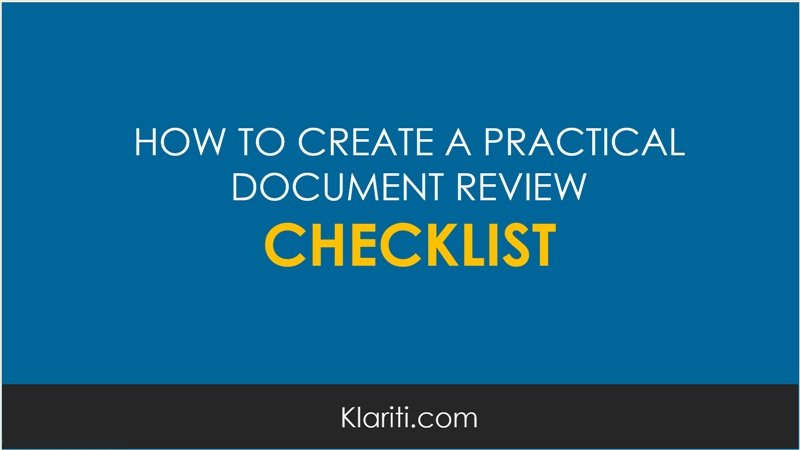Business Writing
How to create a practical document review checklist
One of the problems of reviewing a document online is that you need a common set of guidelines. In theory a style guide should do this but I often find that people tend to avoid them. They’re too much work.
A more practical approach is to create a checklist of the most important things they need to look out for.
http://klariti.com/shop/
Online Document Review Checklist
Here’s one approach to reviewing documents online. Try to get these right and the rest might fall into place.
Language
If you’re working as part of a team, and you’re compiling the document, remember to change all documents to the official language of your document. Don’t trust MS Word. Do it manually. Select the entire document — Ctrl+A — then click the language at the end of the screen, and select the correct language setting.
Date Format
It’s easy to miss wrong dates. Why? 4.1.2019 and 1.4.2019 are both correct. But they mean different things to different readers. To me, it’s the 4th of Jan; you might see the 1st of April. No spell checker will catch this. Instead, search through the document for dates and correct each one. Of course, double-check with the original author before making the changes. Note: Some documents you receive may contain BOTH date formats. This can happen if the author receives documents, emails, and snippets from other writers.
Assume they’re in the wrong format.
References
Don’t assume anything! If you intend to include links to reference documents on other sites, then double-check every reference. Make sure the link works and that it points to the correct page. Remember, links break all the time.
Check all external-facing links before you hit Send.
Quotes
Again, if you intend to quote someone, make sure it’s the right person, and you give them the correct job title.
Check that you’ve got their name right (watch out for different spellings of the ‘same’ name, such as Sean, Shawn, Shaun, Shauna, Sian, Shean), job title (watch out for upper and lower case when spelling it – it’s not often what you think), and whether they’re currently in this role or have moved elsewhere. If they’ve moved to a new position, highlight it.
Presently v Currently
This is just confusing, plain and simple.
Presently doesn’t mean “at present.” It means “in the near future.”
Whereas…
Currently refers to “right now.”
According to Merriam-Webster.com:
Presently means before long.
Currently means occurring or existing in the present time.
Practise v Practise
Practice is a noun (a thing). For example, a doctor’s practice.
Practise is a verb (i.e. to practise your guitar skills).
A lot v Alot
When speaking ‘a lot’ sounds like one word — alot.
Also, words like aloud, alight, align are all one word.
But a lot is two.
It means ONE lot of something.
Separate
Many of us spell separate with an e, i.e. separate, as that’s how we pronounce it. Well, some of us do. Most people don’t pronounce it sep-are-at. We tend to say sep-r-it. Thus the confusion. How to remember? There’s a rat in there. See it? Sepa rat e.
Council v Counsel
Council is a noun.
Think of your local council. Generally, they’re people appointed to serve as administrators, legislators or advisors.
Counsel can be a noun or verb.
- Noun — denotes a legal advisor who conducts court cases.
- Verb — Give advice, for example, a lawyer to a client.
What else would you add?


